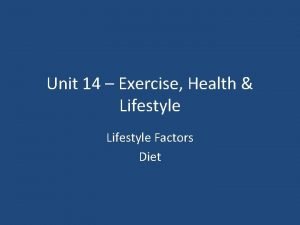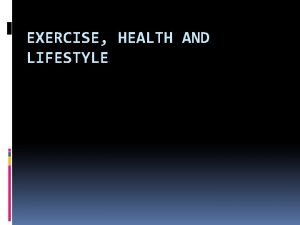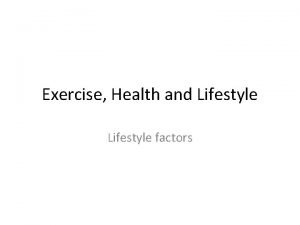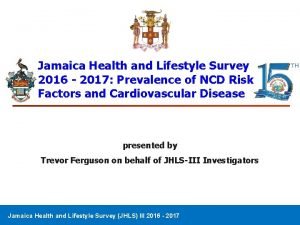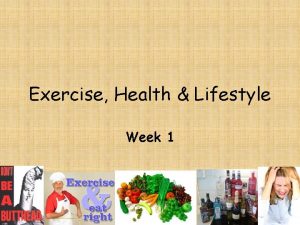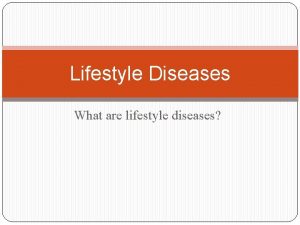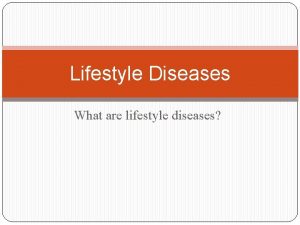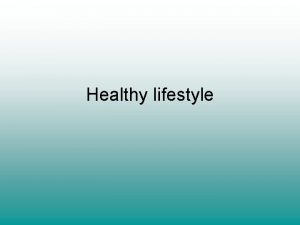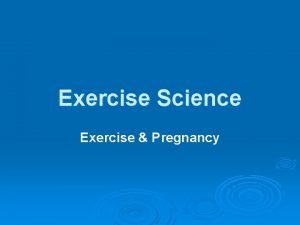Exercise Health and Lifestyle factors Learning outcomes Lifestyle


















- Slides: 18

Exercise, Health and Lifestyle factors

Learning outcomes

Lifestyle factors

Lifestyle factors Matchup task • Lorraine's task

Physical Activity • Physical activity is a very important factor in maintaining a healthy wellbeing. Physical activity does not mean going to the gym for two hours every day. • Physical activity although it does cover sport such as football and swimming it also includes walking and gardening. • Physical activity requires the heart rate to be raised slightly and breathing to be increased.

• It is recommended that adults carry out thirty minutes of moderate physical activity, at least five times per week. The thirty minutes can be broken up in to smaller chunks of ten minutes throughout the day. It is recommended that this is increased for children and young people to sixty minutes per day.

Following Recommendations • By following these recommendations it will lead to a healthier lifestyle and can help with the following: • Reduce obesity • Helps to maintain weight or helps to reduce weight, if overweight. • Reduce risk of coronary heart disease (CHD) • Keeps the heart healthy. • Reduce high blood pressure • Helps to keep blood pressure more stable. • Reduce depression • Helps to make you feel good about yourself. • Reduce stress • Provides a release from everyday pressure.

Booze Britain • Alcohol has become a very big part of the culture in the UK, with many individuals drinking much more than the recommended units per week. As a result there has been an increase in a number of illnesses relating to heart disease and cancer. Although there is no research to show any safe limits on alcohol, recommendations have been set. • http: //www. youtube. com/watch? v=PA 1 g. Do 4 OX p 4&safe=active

Units The recommendations are set here on a daily basis. Providing weekly units may provide the wrong idea that it is acceptable to drink the weekly 21 or 15 units in one session at the weekend. Units should not be saved up throughout the week to be drank at the weekend. Saving units up for a big night out is known as 'binge drinking'. Reasons why males can drink more units • Men are bigger and can therefore absorb more alcohol. • Women have an average of 10% more fat, which means there is less body fluid to dilute alcohol; therefore it has a higher concentration as it travels around the body. • Women get drunk quicker and for longer due to the liver producing a lower level enzyme which breaks down alcohol.

Working out units • It is important to know how to calculate a unit to gain an understanding of exactly how much alcohol is consumed. One unit equals 10 ml of pure alcohol. To calculate the unit of alcohol the following information is needed: • Strength (ABV) • Volume (ml) • Calculating units • The following formula is used to calculate the number of units per drink: • Number of units = Strength (ABV%) x Volume (ml) ÷ 1000

Alcohol type Strength Volume (ml) Drink size Number of units Beer/Lager/Cider 2% 568 Pint 2 Beer/Lager/Cider 5% 568 Pint 2. 8 Beer/Lager/Cider 9% 568 Pint 5. 1 Alcopop 5% 275 Bottle 1. 4 Vodka/Gin/Rum 38 -40% 25 Single measure 1 Vodka/Gin/Rum 38 -40% 50 Double measure 2 Tequilla 38 -40% 25 Shot 1 Wine 10% 175 Standard glass 1. 75 Wine 14% 175 Standard glass 2. 5

Alcohol units The guidelines below should be followed to reduce the risk of suffering from the longterm effects of excessive drinking. • Do not get drunk by exceeding the limits recommended. • Have at least 2 -3 days without alcohol per week to allow liver to repair. • Have at least 48 hours rest before drinking again if you have exceeded the limit. • Eat before you drink as food absorbs alcohol and will prevent you from getting drunk so easily. • Eat while you are drinking to absorb the alcohol and prevent irritation of the gut. • Alternate alcoholic drinks with soft drinks especially water. • Do not save up your weekly units for the weekend, this can cause more damage than drinking the recommended number of units each day.

Smoking • is recommended that to remain healthy smoking should be avoided due to the health risks associated with it. Smoking leads to both short and long-term effects on the body. Smoking kills around 115, 000 people each year in the UK. • This is from illnesses such as cardiovascular disease, emphysema and cancer. It is not only people that smoke that can be harmed through smoking; • second hand smoke can also lead to similar effects. Second hand smoke is when people that do not smoke, breathe in the fumes of someone smoking. It is the content of a cigarette that causes the damage including tar, nicotine and carbon monoxide.

Stress is described as a non-specific response of the body to any demand made upon it. It is how an individual feels they can cope with a situation. Stress is a substantial imbalance between psychological and physical demands placed on an individual and their response capability, under conditions where failure to meet demands has important consequences (Mc. Grath; 1970). Stress is often needed as it can help to motivate individuals and can often produce the best results when people work under pressure. However, ensuring that there is the right balance of stress in a person's life is important to remaining healthy. Feeling stressed for long periods of time can lead to many health risks.

Health effects • There a number of long-term effects associated with stress. Click on the link below to find a table which provides a description of some the risks and explains what effect it has on the body. The risks include both psychological and physical effects. When people are stressed they often do not look after themselves properly and are: • Less likely to eat a balanced diet • More likely to drink more alcohol • More likely to smoke more cigarettes • Less likely to sleep well • Less likely to do any exercise

Carbohydrates provide energy and is broken up in to two parts: Simple carbohydrates such as sugars which provide short bursts of energy. Complex carbohydrates such as starch which provides longer bouts of energy. Protein provides growth and development for the body, it also aids in repairing any damage caused. Diet Fat can also provide energy once all of the carbohydrate energy has been consumed. There are two types of fat: Saturated fat which provides insulation and protects against the cold. Unsaturated fat surrounds the vital organs and is there to protect them Vitamins and Minerals Vitamins and minerals are essential to good health, but are only needed in small amounts. Eating a balanced and varied diet will ensure that the correct amounts of vitamins and minerals are available for the body.

Dietary guidelines It is essential that a healthy diet contains the following: • At least 5 portions of fruit and vegetables. • Complex carbohydrates should make up a third of each meal. • Two portions of fish per week, including one oily fish. • No more than 6 grams of salt should be consumed per adult. • Avoid excess sugar found in sweets, cakes and fizzy drinks. • Drink at least eight glasses of water per day. • Do not eat snacks that are high in fat or sugar, replace with fruit or vegetables. • Do not skip meals as this slows down the metabolism.

So what were they
 Unit 14 exercise health and lifestyle
Unit 14 exercise health and lifestyle Exercise health and lifestyle
Exercise health and lifestyle Exercise health and lifestyle
Exercise health and lifestyle Jamaica health and lifestyle survey 2019
Jamaica health and lifestyle survey 2019 Example of learning objectives
Example of learning objectives Learning objectives for direct and indirect speech
Learning objectives for direct and indirect speech Objectives of input output management
Objectives of input output management Sound energy definition
Sound energy definition Learning outcomes of profit and loss
Learning outcomes of profit and loss Learning objectives of work and energy
Learning objectives of work and energy Roman number 5200
Roman number 5200 Factors affecting oxygenation pdf
Factors affecting oxygenation pdf Learning outcome examples
Learning outcome examples Learning outcomes of water cycle
Learning outcomes of water cycle Learning outcomes of notice writing
Learning outcomes of notice writing Objective of swot
Objective of swot Rhymes learning outcomes
Rhymes learning outcomes Photolysis in photosynthesis
Photolysis in photosynthesis Learning outcomes of nutrition in plants
Learning outcomes of nutrition in plants
